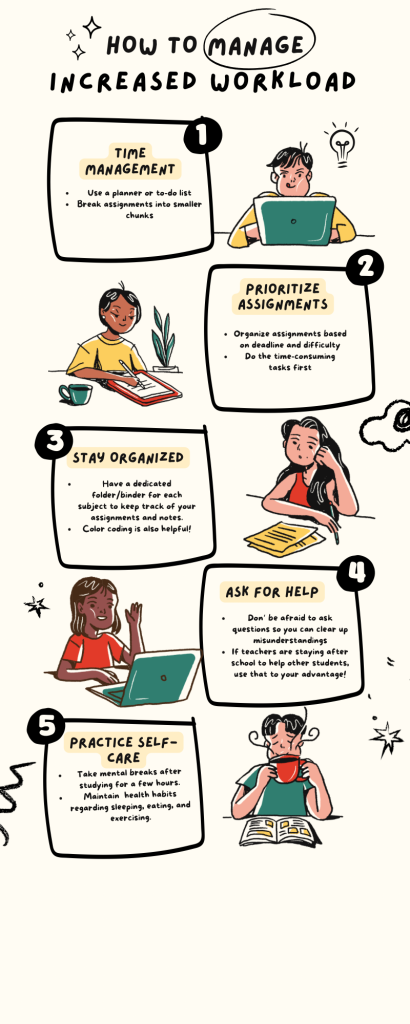By Marvi Pabrekar (’26) | Managing Editor
Initially, it’s tough to move to harder classes, like from CP to honors or honors to AP. The amount of work and expectations go up. It might be difficult to keep up with the extra work. But it’s doable if one has a proper method for tackling it. Managing your time, prioritizing your assignments, staying organized, asking for help, and taking care of yourself are all very important ways you can make your transition into harder classes easier.
1. Managing your time is important.
One of the biggest challenges with moving to harder classes involves time management. Honors and AP classes require much more reading, writing, and problem-solving; in turn, students have to manage their time more effectively. This may be assisted by keeping a planner or using some sort of electronic tool to block out assignments and due dates. Splitting assignments into smaller parts can also help prevent last-minute studying. For instance, rather than racing to finish an entire essay the night before, you can plan on one day, write the introduction on the second, and so forth until completion.
2. Assignment Priority
When transitioning to more challenging classes, it is especially important to prioritize assignments by due date and level of difficulty. For instance, if an extended essay and a brief worksheet are due on the same day, it would be wise to start with the research paper. In this way, students working on the most challenging tasks first ensure that they do not rush through the most important assignments.
3. Stay Organized
Be as organized as possible when going through harder classes. This not only means organizing your time but also your notes, books, and assignments. For each subject, develop a system to keep track of handouts, notes, and homework. This could be a folder on your computer that is only used for school or a binder tabbed according to units. The more you keep things in order, the more easily you will see how you are doing and then quickly find what you need when studying for tests or finishing homework.
4. Don’t be afraid to ask for help.
It’s hard to move up to honor or AP classes, but that does not mean help is not available. Teachers know that students could struggle with the alteration in difficulty, so one should not be afraid to ask questions if something wasn’t clear. Many teachers provide after-school help sessions; using them could help a lot.
5. Take Care of Yourself
It is pretty easy to get sucked into your workload and forget about self-care, but it is very important that one makes time to take breaks and find time to relax. Keeping up with assignments is important, but sleeping, eating, and taking mental breaks when needed are very important. Finding the balance between work time and downtime would be critical to avoid burnout, especially in those harder classes. The skills learned in these classes- thinking critically, managing time, and being a self-disciplined person last long after high school. It may take some time to get used to, but with good planning, organization, and support, the workload becomes easier to handle. It’s a challenge, but the reward is the growth of a student in their studies and preparation for success in the future.


